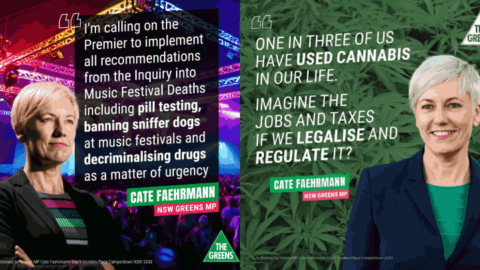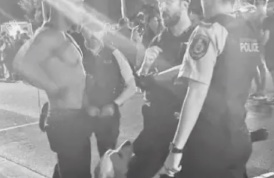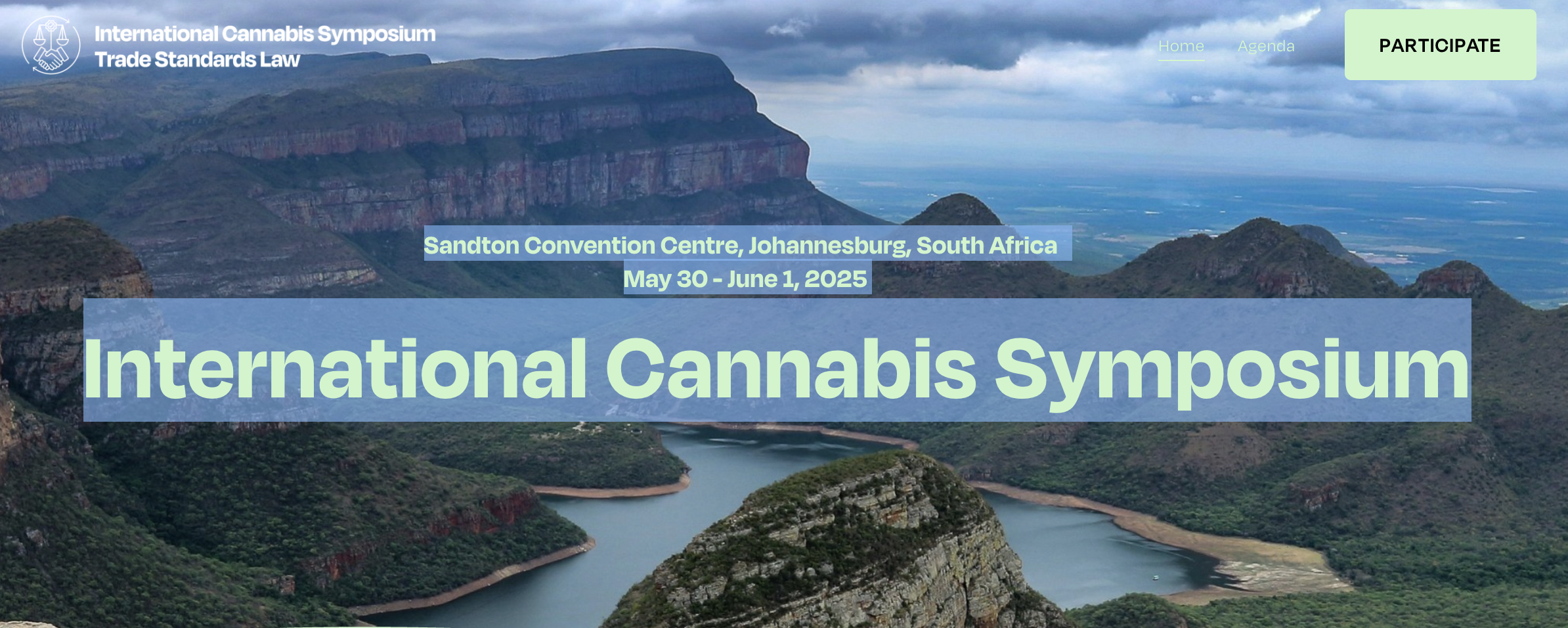The Australian prime minister marching in the Sydney Mardi Gras this year marked a stark shift in societal values as compared with the first time the event was staged in 1978, which saw the NSW police violently set upon the criminalised participants taking part in what was a queer rights protest.
But the gloss of Albanese’s appearance served to overshadow the strong opposition to the NSW Police Force presence at Saturday night’s event. This was in terms of the 1978 attack, the four decades of gay hate crimes that prevailed in this city and the saturation drug policing this year.
“This is the side of Sydney that the government should hang its head in shame over,” said NSW Greens MLC Cate Faehrmann on posting the above photo of police questioning a partygoer, “particularly at a time when we are supposedly showing our best to the world for WorldPride.”
As the drug law reforming politician points out, this year’s parade being part of the broader WorldPride festival meant thousands of international visitors were subjected to a heavy police patrolling with drug dogs, while some individuals were taken away to be strip searched.
A life-threatening approach
“I sat and watched with disgust as dozens of police with dogs walked up and down the long line of people waiting to be let into the party, taking away members of our queer community and strip searching them,” Faehrmann continued in her Sunday post.
The Greens drug law reform spokesperson underscored that as WorldPride is a global event, attendees from abroad will be reporting on the heightened way in which state law enforcement officers police such events in NSW on a regular basis.
Indeed, since the turn of the century, NSW police has been hounding the public with sniffer dogs, and over the last decade, this has been accompanied by strip searches. And this practice locates nothing illegal two-thirds of the time and when it does, it’s usually a small amount of cannabis.
But the traumatisation of the public that this authoritarian approach results in is not the worst of it. The NSW coroner and countless medical experts have made clear that this excessive police presence leads people to partake in risky drug-taking behaviours that sometimes leads to death.
A lifesaving approach
However, there is a nonpunitive method to prevent recreational drug harms and deaths at events like Mardi Gras and that’s pill testing. This evidence-based harm reduction intervention has been operating in certain enlightened European nations since the 1990s to the benefit of many.
Faehrmann has been calling on NSW premier Dominic Perrottet to implement pill testing in the lead up to the Mardi Gras parade, which has been all the more vital due to the drug-related death of a young person at a Sydney music festival just a week before WorldPride kicked off.
Sydney Criminal Lawyers spoke to Faehrmann on the day prior to Mardi Gras about greeting international visitors with walls of officers, drug dogs and strip searches, the recent festival tragedy and the drug law reform agenda she has set for the next NSW parliament after the March election.

NSW Greens MLC Cate Faehrmann
Cate, you’ll be attending the annual Mardi Gras Parade tomorrow night, which, this year, is a part of WorldPride.
Thousands of people from across the planet are set to be in attendance, and many festivalgoers will be confronted with numerous police officers with drug dogs and accompanying strip searches.
What sort of statement is this sending to the international community?
Tens of thousands of LGBTIQA+ people and their allies from all across the world are descending on Sydney to celebrate and party over the next two weeks.
Many will never have experienced the sort of harassment and humiliation that NSW police like to subject people to who are simply waiting in line to attend a dance party or club.
Any visitor attending any of the fabulous WorldPride events and who witnesses this state’s over-the-top police and sniffer dog presence or, god forbid, is subjected to a strip search will be telling not only their friends and family back home but probably the world via social media too.
I’ve called on the government to instruct the police to respect WorldPride and allow people to party safely and without harassment but it’s fair to say I’m not hopeful they will do this.
Another young person recently died in drug-related circumstances at a NSW music festival. You’ve called for the implementation of pill testing services.
Perrottet has ruled this out, which is his party’s regular line. But a clear difference between when Berejiklian ruled out this evidence-based approach and the present is that Canberra now has a state-sanctioned fixed site pill testing service operating.
How viable is it for the Liberal Nationals to deny pill testing when a jurisdiction within NSW has accepted it as a vital health intervention?
We know pill testing works. There have been zero deaths at festivals in the ACT where pill testing has been present and now people are able to get their drugs checked at a community clinic in the Canberra CBD.
We know that this means that potentially deadly substances can be identified, and that people are provided information by health professionals about how to reduce harm.
We also know that once people are told what’s in the drug they were intending to consume, some choose to dispose of the drug safely at the clinic.
When defending his decision to reject pill testing, the premier said “the safest thing is to just don’t take drugs”.
This is not only extremely frustrating, it’s reckless.
The coronial inquest into those six tragic deaths at music festivals four years ago, specifically highlighted that telling young people “just say no” not only doesn’t work but actually puts them at greater risk.
There have been calls for pill testing services in this country since early this century, but the current campaign really picked up in this state in 2015 at the time of the Baird government, following a spate of six-drug related festival deaths nationally.
Similar calls were made under Berejiklian as another six such deaths took place at NSW music festivals over late 2017 to early 2019, as you’ve just noted.
There’s been ample time for the Coalition to implement the public health intervention prior to WorldPride. So, how do you consider the global event going ahead without it?
Pill testing would have allowed people to test their drugs for strength and/or deadly substances and speak to people about how to stay as safe as possible if they do choose to use drugs.
This latest death is terribly sad and may have been avoided if it weren’t for our zero-tolerance approach to drug use where we push it underground.
The government has a wealth of expert evidence about how to prevent deaths at dance parties and music festivals, but many have been wilfully ignored.
Harm Reduction Australia has given an open offer to the NSW government to provide pill testing services for free that could have been taken up for WorldPride.
Instead, the government is recklessly pursuing its dangerous drug policies which do not work. It’s infuriating.
Underlying these issues are calls for drug decriminalisation, which the NSW Coalition continues to refuse to properly consider, while the ACT is about to implement such a policy under a Labor-Greens government.
With NSW Labor likely voted into parliament next month, do you consider it will be more open to decriminalisation considering the same party has greenlighted it in the capital?
We know from 12 years of the Liberal Nationals that there is no hope for serious drug law reform with them in charge.
However, we’ve seen nothing positive from Labor in this area either. The major parties seem to be lockstep in continuing the failed war on drugs.
If Labor does win government, they have promised a drug summit which is something.
Whether or not they have the courage to do what the experts are saying is needed in terms of drug law reform – particularly decriminalising all drugs and treating drug use as a health issue not a criminal one – my hopes aren’t high.
Having said that, it’s my hope that the Greens will hold the balance of power in the next parliament so that we can make Labor, if they do form government, act on drug law reform and save lives.
And lastly, Cate, what can the state expect from the NSW Greens post-election in terms of seeing drug law reform being implemented?
Drug law reform will be one of my top priorities in the next term of parliament. The Greens are committed to pushing serious drug law reform in the next parliament.
I’ll be introducing legislation to legalise cannabis, protect medicinal cannabis users from unfair drug driving laws, decriminalise the personal use of drugs and provide pill testing at festivals.
Source:
https://www.sydneycriminallawyers.com.au/blog/nsw-police-with-drug-dogs-saturate-global-mardi-gras-an-interview-with-greens-mlc-cate-faehrmann/


 Cannabis News2 years ago
Cannabis News2 years ago
 One-Hit Wonders2 years ago
One-Hit Wonders2 years ago
 Cannabis 1012 years ago
Cannabis 1012 years ago
 drug testing1 year ago
drug testing1 year ago
 Education2 years ago
Education2 years ago
 Cannabis2 years ago
Cannabis2 years ago
 Marijuana Business Daily2 years ago
Marijuana Business Daily2 years ago
 California2 years ago
California2 years ago





















